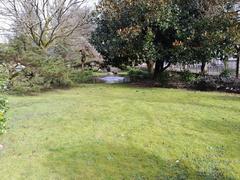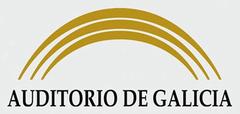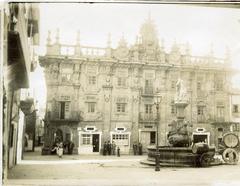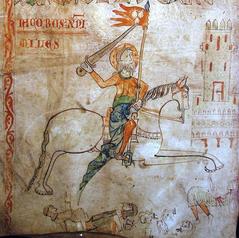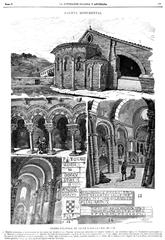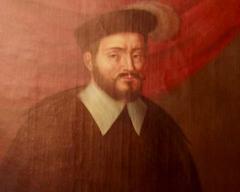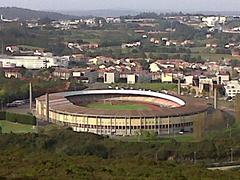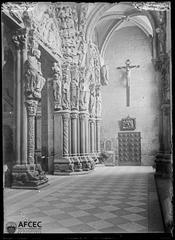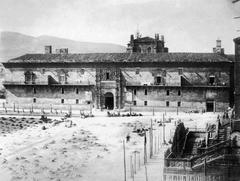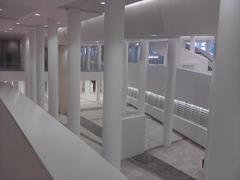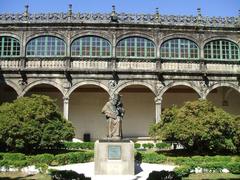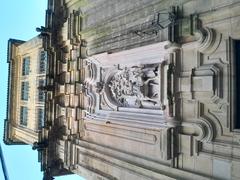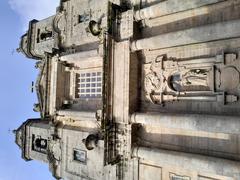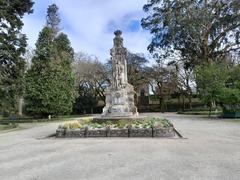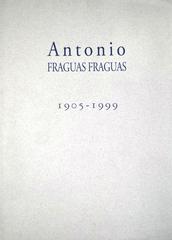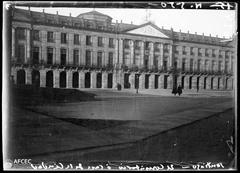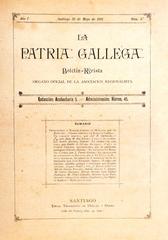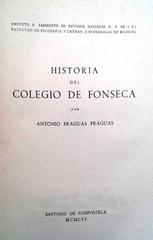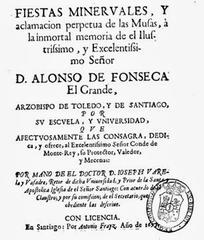Church Of María Salomé, Santiago De Compostela
Visiting the Church of María Salomé in Santiago de Compostela, Spain: Tickets, Hours, and Tips
Date: 04/07/2025
Introduction
Tucked within the UNESCO-listed historic center of Santiago de Compostela, the Church of María Salomé (Iglesia de Santa María Salomé) stands as a unique testament to the city’s religious lineage, architectural grandeur, and vibrant community life. Dedicated exclusively to Saint Mary Salome—the mother of the Apostle James the Greater—this church offers a rare spiritual and cultural experience for pilgrims, history enthusiasts, and travelers alike. Blending Romanesque, Gothic, and Baroque elements, it not only reflects the city’s architectural evolution but also anchors the traditions of the Camino de Santiago pilgrimage (Turismo de Santiago; CVC Cervantes).
This detailed guide provides all you need to know to plan your visit: historical highlights, architectural features, practical details on hours and admission, accessibility, travel tips, and ways to integrate your experience with Santiago’s broader religious and cultural landscape.
Historical and Architectural Overview
Origins and Historical Context
Founded in the 12th century, the Church of María Salomé is one of the oldest parish churches in Santiago de Compostela. Its dedication to Saint Mary Salome underscores its close ties to the apostolic roots of Christianity in Spain, as she is revered as the mother of St. James the Greater, the city’s foremost patron saint (Turismo de Santiago; Galicia Guide). The church’s establishment coincided with the rise of the Camino de Santiago, providing spiritual services for the ever-increasing number of pilgrims journeying to the city.
Romanesque Foundations
The original structure features classic Romanesque architecture: strong granite walls, rounded arches, and a robust, austere façade. The main portal, adorned with archivolts and detailed capitals, is a highlight, showcasing intricate carvings and symbolic motifs typical of 12th-century Galician craftsmanship (Arteguias).
Gothic and Baroque Transformations
Subsequent centuries brought significant artistic enhancements. The late Middle Ages introduced Gothic chapels, ribbed vaults, and pointed arches, while the 18th-century Baroque renovation added the church’s distinctive tower, ornate altarpiece, and decorative interiors. The Baroque façade, with its pilasters and volutes, and the gilded main altarpiece dedicated to St. Mary Salome, reflect the exuberance and spiritual aspiration of the era (Turismo de Galicia; Santiago Turismo).
Artistic and Iconographic Significance
- Romanesque Portico: The sculpted capitals feature stylized foliage, interlacing patterns, and symbolic animals, inviting contemplation of the divine.
- Gothic Chapels: Patron-funded chapels with ribbed vaults and polychrome altarpieces highlight the artistic patronage of Santiago’s elite (CVC Cervantes).
- Baroque Tower: The 18th-century bell tower enhances the church’s urban presence, serving as a beacon for pilgrims and locals alike.
Restoration and Preservation
Modern restoration projects have preserved the church’s structural integrity and artistic treasures, ensuring its ongoing role as a living monument and active parish. Conservation efforts have been particularly attentive to the Romanesque portal and Baroque interiors (Turismo de Galicia).
Religious and Community Life
The Church of María Salomé continues to serve as a vibrant parish, hosting daily Masses and liturgical celebrations, often accommodating overflow from the nearby Cathedral. Major feast days—such as the feast of St. James (July 25) and the church’s own patronal festival (October 22)—draw both locals and pilgrims, blending religious devotion with community festivities.
Beyond worship, the church acts as a cultural center, hosting concerts, exhibitions, and events that reinforce its status as a cornerstone of local identity (Turismo de Santiago).
Practical Visitor Information
Location and Getting There
- Address: Rúa Nova, Historic Center, Santiago de Compostela, Spain
- Access: Less than a five-minute walk from the Cathedral of Santiago de Compostela, surrounded by pedestrian streets lined with shops and cafés.
- Transport: Nearby bus stops (Praza de Galicia, Praza de Cervantes) and public parking garages (10–15 minutes on foot).
Visiting Hours and Mass Schedule
- Regular Masses: 7:30, 9:00, 10:00, and 19:00 (daily)
- Saturday Mass: Additional at 18:00
- Sunday Mass: Additional at 13:00
- Hours may vary during festivals and special events; confirm in advance via the Pilgrim’s Office.
Admission and Tickets
- Entry: Free for all visitors; donations welcomed for maintenance.
- Tickets: Not required for general visits or Mass attendance.
- Guided Tours: While the church does not offer its own tours, it is featured in many local walking tours. Audio guides and virtual content (such as the Audiala app) provide additional context (Travalour).
Accessibility
- Access: Street-level entrance is wheelchair accessible. Note that nearby cobblestone streets may require assistance for those with mobility challenges.
Facilities
- Onsite: No dedicated restrooms or cloakrooms; nearby cafés and public facilities are available.
- Support: The Pilgrim’s Reception Office offers multilingual assistance, maps, and further information.
Photography and Etiquette
- Photography: Permitted outside Mass times; avoid flash and remain discreet, especially during services.
- Dress Code: Modest attire recommended; shoulders covered, hats removed inside.
Integrating Your Visit with Santiago’s Historic Sites
Nearby Attractions
- Cathedral of Santiago de Compostela: The city’s iconic pilgrimage destination (more info).
- Praza do Obradoiro: Main square hosting the Cathedral, Hostal dos Reis Católicos, and city hall.
- Museo do Pobo Galego: Museum of Galician culture and history.
- Mercado de Abastos: Lively food market showcasing local flavors.
- Alameda Park: Panoramic views of the Old Town and Cathedral.
Suggested Itinerary
Start your morning with Mass at María Salomé, explore the Cathedral and museum, then stroll through Santiago’s historic streets, enjoy Galician cuisine at Mercado de Abastos, and relax in Alameda Park.
Essential Visitor Tips
- Best Times: Early mornings and late afternoons for quiet reflection and best light for photography.
- Languages: Services are in Spanish or Galician; the Pilgrim’s Office provides multilingual support.
- Safety: Santiago de Compostela is safe; remain mindful of personal belongings.
- Peak Dates: Feast of St. James (July 25), Holy Years, and Easter see the highest visitor numbers—book accommodations ahead (details).
- Pilgrim Services: Compostela certificates and queue management via QR code system at the Pilgrim’s Reception Office (details).
- Etiquette: Maintain silence during services and be discreet when photographing.
Frequently Asked Questions (FAQ)
Q: What are the visiting hours of the Church of María Salomé?
A: The church is open daily, with Masses at 7:30, 9:00, 10:00, and 19:00; additional Masses on Saturday at 18:00 and Sunday at 13:00. See official updates.
Q: Is there an entrance fee or need for tickets?
A: No, admission is free and no tickets are required.
Q: Can I take photographs inside the church?
A: Yes, outside of liturgical services and without flash.
Q: Is the church accessible for wheelchair users?
A: Yes, the entrance is at street level, though surrounding cobblestones may present challenges.
Q: Are guided tours available?
A: The church is included in many local walking tours; audio and virtual guides are also available (Travalour).
Visuals and Media Suggestions
- High-resolution images of the Romanesque portal, Baroque tower, and interior artworks with descriptive alt tags (e.g., “Church of María Salomé façade in Santiago de Compostela”).
- Interactive map showing the church’s location in relation to the Cathedral and other landmarks.
- Links to virtual tours or 360-degree walkthroughs, if available (Santiago Turismo).
Practical Contacts
- Church of María Salomé: Rúa Nova, Santiago de Compostela, Spain
- Pilgrim’s Reception Office: Rúa Carretas, 33, 15705 Santiago de Compostela
Tel: +34 981 568 846 | [email protected]
Pilgrim’s Office Website
Call to Action
Enhance your visit to the Church of María Salomé and Santiago de Compostela by downloading the Audiala app for real-time updates, guided audio tours, and personalized tips. Follow official tourism channels for event news, or explore our related articles to deepen your understanding of Santiago’s cultural and religious heritage.
Summary
The Church of María Salomé is a distinctive gem within Santiago de Compostela’s historic fabric, offering a blend of spiritual resonance, architectural artistry, and community vitality. Its unique dedication, central location, and welcoming atmosphere make it an essential stop for any traveler or pilgrim. Engage more deeply with your visit by leveraging digital resources, joining guided experiences, and respecting the living traditions that continue to shape this remarkable city.
References
- Turismo de Santiago – Iglesia de Santa María Salomé
- CVC Cervantes – Santa María Salomé
- Santiago Turismo – Iglesia de Santa María Salomé
- Oficinal del Peregrino – Mass Schedule
- Santiago Turismo
- Galicia Guide
- Arteguias
- Turismo de Galicia
- Travalour – Secrets of Compostela Private Tour
- Cathedral Travel Facts
